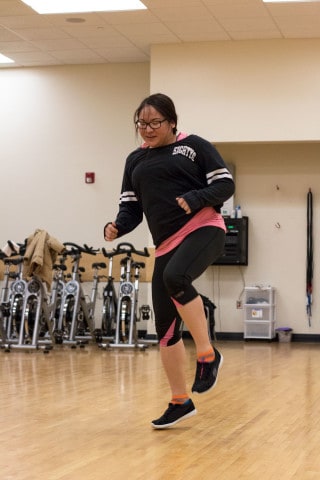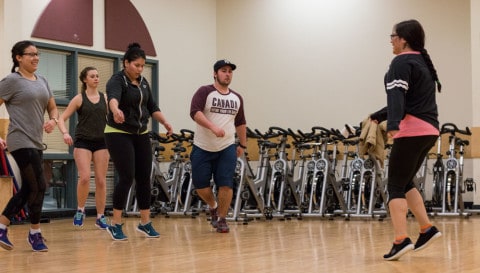While the University of Saskatchewan continues to make moves to Indigenize the institution in various ways, one alumna is applying a similar mindset to her business, which combines Aboriginal culture with physical fitness and is currently available through Recreation Services on campus.
 According to the business’s mission statement, AB Original Health and Fitness aims to promote active living and cultural inspiration to help First Nations people manage, battle and decrease the risk of diabetes, one of the most predominant diseases worldwide.
According to the business’s mission statement, AB Original Health and Fitness aims to promote active living and cultural inspiration to help First Nations people manage, battle and decrease the risk of diabetes, one of the most predominant diseases worldwide.
The inspiration for the business resulted from BrandyLee Maxie’s personal experience with Type II diabetes while she was in school, which she ultimately overcame through weight loss.
Maxie, member of White Bear First Nation and founder of AB Original Health and Fitness, is also the mother of three children, two of whom have been diagnosed with Type I diabetes, which prompted her to encourage people to lead a healthier lifestyle, while also celebrating their culture.
“Right now, my focus is actually on diabetes prevention and I know that in First Nations communities, they have dietitians, they have health clinics that provide diabetes workshops and stuff like that. They also have fitness facilities, but those fitness facilities don’t always have a fitness instructor,” Maxie said.
AB Original Health and Fitness is now offering the U of S community a unique fitness program called POWFit, which incorporates powwow dance moves into a fitness routine. Powwows are celebrations that showcase Aboriginal music, dance, food and crafts and also promote cultural pride, respect and health for both young and old in an inclusive setting.
The class is held every Wednesday evening from 7–8 p.m. in the Physical Activity Complex and students can register for the class through U of S Recreation Services. Maxie welcomes everyone and ensures that the class does not discriminate.
“I think sometimes people get the misconception that it might be just exclusive to First Nations participants, but it’s not. It’s open to everybody and I don’t use any kind of regalia or anything,” Maxie said.
She believes that it is significant to promote Aboriginal culture within the education system as a way of honoring the original practices of the land.
“I think it’s important to understand the dance because we all have high respect for our dance styles. It’s kind of a way to educate people on the dance moves or various dance styles outside of just seeing all the regalia, the bells, and the jingles … There is a story behind each [dance]. So I also wanted to spend some time to share what dance moves we’re doing that day or where inspiration comes from and what that dance is,” Maxie  said.
said.
Maxie also shared how important the preservation of Aboriginal culture is and recognized that there is an urgency to keep the culture alive.
“I think it’s very important, like in the residential school system we’re actually designed to get rid of our culture and traditions and a lot of our elders, they’re getting older and they’re a lot of our knowledge keepers … We’re running out of elders that we need to preserves these … Our dance too, it goes hand-in-hand with our language and our stories so they’re all kind of interconnected,” Maxie said.
Running this business has taught Maxie a great deal and as a young entrepreneur, she shares some advice for students who are struggling to pursue their own careers.
“It may not be the easiest journey, but you can’t let the amount of time it takes to keep you from getting where you want to get. You can’t let that time intimidate you because time can pass anyways. You got to have patience and determination and you really have to know why you’re doing what you’re doing. Why you chose that business, why you have a passion for it, because that’s what’s going to keep you dedicated to it.”
—
Jaline Broqueza
Photos: Caitlin Taylor / Photo Editor
Leave a Reply